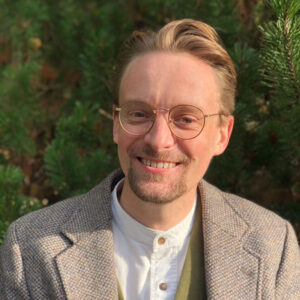As James Nowak prepares to graduate, he is grateful to have found a community of academics and proud to join the long line of scholars who have proceeded him. While at St. Michael’s, he deepened his understanding of Mediaeval Studies by contributing to the Dictionary of Old English and conducting award-winning research in a fourth-year independent study course.

But one of the most impactful lessons in his academic journey took place outside the classroom. When James had a question about how to cite one of his papers, he approached his Professor Brent Miles on how to properly acknowledge his sources, who responded succinctly with “just be generous”.
“It completely inverted the way I had thought of citations. I had previously thought of it as something you do so you don’t get in trouble, but in those three words I realized that’s how a real scholar sees the citation method,” he says. “Be generous to these people who’ve given so much of their lives so that I could learn.”
James’ decision to pursue a specialist in Mediaeval Studies stemmed from a desire to learn to read and recite Old English. After dabbling in online courses, he wanted to commit himself to this goal by attending university. He was surprised to learn that close to his hometown of Guelph was an international centre for medieval studies at UofT – both in SMC’s undergraduate Mediaeval Studies program and in the graduate Centre for Medieval Studies.
“I wanted to immerse myself in a place where there were experts in academic tradition. I can’t imagine a better place for me to have undertaken my studies,” he says.
He enjoyed the variety of courses offered under the umbrella of the Mediaeval Studies program and discovered a new interest in Mediaeval Theology. “I found a degree program that aligned with so many things I’m passionate about and permitted so much exploration of those passions. I was learning from experts in their field who helped me push my ideas further. They held me to a standard that I didn’t possess internally, and it was very conducive to learning,” he says.
He also appreciated that his professors were open to his enthusiasm for independent research. One of these projects he completed was an independent reading course on the history of participatory metaphysics in the Christian West, which was supervised by Professor Alexander Hampton. The final essay for this project earned him the 2024 Canadian Society for the Department for the Study of Religion (DSR)’s Undergraduate Essay Prize.
“The nature of undergraduate writing is that you’re going from one relatively brief assignment to the next, but with this project I was able to take my time. I felt like it was a real expression of what I was capable of. It was nice to have it recognized by my professor and the greater community and to have something you’re proud of affirmed,” he says.
In his second year, he had the opportunity to work under the supervision of Professor Valentine Pakis to contribute to the Dictionary of Old English, which defines the vocabulary of the first six centuries (C.E. 600-1150) of the English language.
He has learned to read and recite Old English and is now improving his Mediaeval Latin. Receiving his degree on June 13 will be “a milestone in an ongoing journey,” as his courses have broadened his horizons to new areas of study that he will pursue in graduate school at U of T’s Centre for Medieval Studies. His studies will be supported by a scholarship awarded through the Social Sciences and Humanities Research Council that recognizes high-calibre scholars engaged in graduate studies.
For more on our Class of 2025 graduands :

